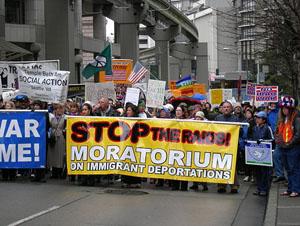What happens to America’s deported immigrants
During an anti-war demonstration in March 2007 in Seattle, Wash., demonstrators protest deportation of undocumented citizens (Photo from Wikimedia Commons)
Story from The Takeaway. Listen to audio above for full report.
Capture seems to be the least of an undocumented immigrant’s worries, according to Peter O’Dowd, news director for KJZZ in Arizona. O’Dowd recently returned from Guatemala, where he followed a group of Guatemalens deported from the United States. O’Dowd accompanied the immigrants on a flight from the US and stayed with them as they made their way back to their hometowns.
“I had basic questions,” said O’Dowd. “Like: ‘Who are the flight attendants? What do they eat? What happens when they get on the ground? To me it seemed like a slice of American government that not a lot of people get to see.”
On the plane to Guatemala, O’Dowd encountered many passengers who had spent decades in the U.S., and had to leave homes, family and friends behind. One passenger was a former Guatemalan police officer who had been living in the U.S. for over 12 years. He said he was afraid to return to Guatemala because of the high crime rate and poverty in his hometown, Guatemala City.
Record numbers of undocumented immigrants have been reported under the Obama administration, despite the president’s acknowledgement that the country’s immigration policy separates families and punishes children. During his trip, O’Dowd met many families in the small Guatemalan city of Calderas who had been deported in 2008 as part of the Postville, Iowa raid — the largest immigration raid in the history of Immigration and Customs Enforcement.
In picturesque, yet impoverished Calderas, O’Dowd met 16 children who had been born in the U.S., and were deported with their parents. The children had legitimate American passports, Social Security cards, and birth certificates. O’Dowd recalled one mother who was determined to someday return her son to the U.S.
Despite the difficult struggles and heartbreaking consequences faced by illegal immigrants, O’Dowd says the conditions from which they come from are so poor that the risk they take to get to the U.S. is worth the trouble.
“No matter what the deportation situation is, it’ll be a deterent in some way for some people,” O’Dowd said. “But at the end of the day, the place is so poor that there’s always going to be the draw North.”
————————————————————–
“The Takeaway” is a national morning news program, delivering the news and analysis you need to catch up, start your day, and prepare for what’s ahead. The show is a co-production of WNYC and PRI, in editorial collaboration with the BBC, The New York Times Radio, and WGBH.
